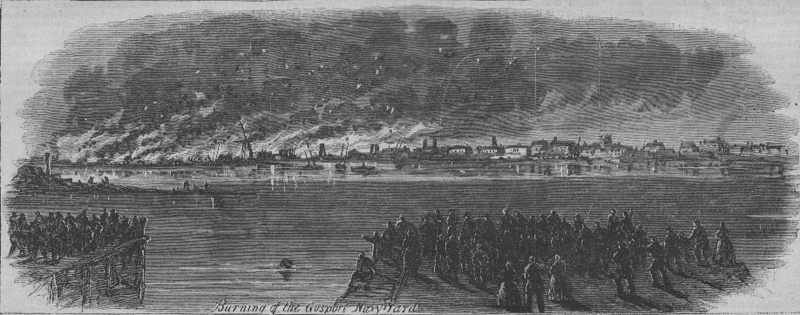
SURRENDER OF NORFOLK - MAY 10-11, 1862
PAGE 8
HOTEL ACCOMMODATIONS.
We turn from the terrible scene to look out for a place where we may get some refreshments and rest our weary limbs. We seek what was once the finest hotel in the city – the “Atlantic.” General Viele is there before us, and has secured his rooms. There is but little in doing this. The landlord positively assures us that upon this day he had determined to close his establishment, having but three boarders besides the members of his own family, and having 200 rooms at his disposal. We enter our names on the register after a lengthy list of C.S.A. officers, who had occupied, perhaps last night, the very beds that we were to be favored with.
THE BILL OF FARE.
After bath, we entered the dining saloon to obtain supper. We called for a cup of tea, but they gave us a horrible-looking red concoction of herbs, - if weeds may rank botanically as herbs – that was positively revolting to all out preconceived ideas of palatableness. We forthwith exclaimed that we had make a mistake, and intended to have called for coffee. While chucking over this brilliant piece of diplomacy, the coffee came in on a steaming tray; but we found upon analysis that it was even worse than the tea – being little else than dirty water brewed from lye. The landlord helped us in a beaming way to a small piece of beefsteak which was very nice, and capped the climax with a roast chicken.
“Have you any salt?” asked General Viele.
“We have some, sir, but we seldom place it upon the table. It is very scarce, and only pounded rock salt at that.”
This, of course, reduced the General to the necessity of being calmly philosophical. We made the best of our meal, nevertheless, and after a turn around through the streets retired to our couches.
TWO STEAMERS COMING UP – WHAT ARE THEY?
Sunday Morning, May 11, 8 A.M. – The city is quit in every part, and the provost guard preforming its duty well. A number of citizens are walking down the wharf, and we follow them. Soon a great hue and cry is raised that the steamer is coming up the river. This, of course, causes the assemblage of speculative groups. The Secessionists express the opinion that Commodore Tatnall, in command of the Merrimac, finding it impossible to go up James river, has followed the instructions of the Confederate Government, and blown her up. They can all distinctly remember hearing this morning early a terrible explosion. All rush to the wharf. They see a little, insignificant wisp of a vessel approaching under full steam. It appears to be a round, sheet iron, floating infernal machine or buoy. But the soldiers maintain that they can see the stars and stripes floating from its staff. And now another little vessel is seen coming up behind. The soldiers are asked by the citizens if they can tell what craft it is.
“That?” says a sergeant of cavalry, “why, I should think you would all know it – that is the Yankee cheese-box – the little Monitor! And the one behind her is the little Naugatuck, with her terrible gun that frightened off the Merrimac the other day.”
Up comes the Monitor closer and closer, until she reaches a large floating sheet – iron buoy, anchored in the stream, no doubt to mark the channel. Lieut. Jeffers, who is in command of the Monitor, and ever on the alert for danger, steams cautiously up to the buoy, and examines it carefully. In an instant a sailor jumps upon it, winking, lest it should prove an infernal machine. He opens the sliding valve, disappears, head and all, within, makes a full examination, jumps out, and reports all correct to commanding officer. The Monitor comes to anchor, and her sailors come up on deck, mount the turret, and give a glorious three times three for the occupation of Norfolk. The crew of the Stevens battery quickly follow suit.
Surrender of Nofolk Continued
Back, page 1, page 2, page 3, page 4, page 5, page 6, page 7, page 8, page 9, page 10, page 11, Next
Source of Information
The Press, Philadelphia, PA Newspaper, Tuesday, May 13, 1862.
Image from Harper's Weekly May 24, 1862.
